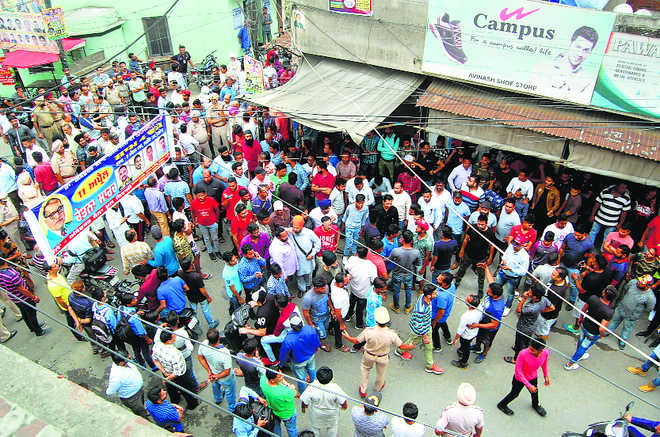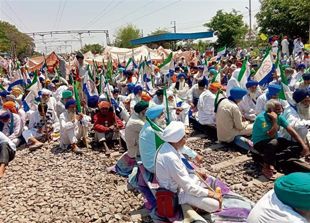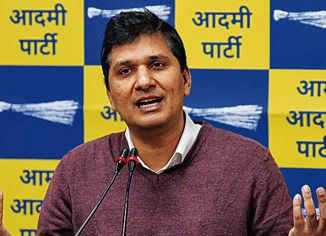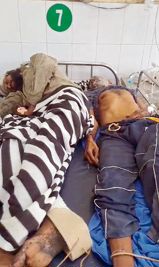
Showdown time: Shopkeepers confront protesters as they enforce shutdown against the dilution of SC/SC Act, in Phagwara. Tribune photos: Malkiat Singh
Deepkamal Kaur in Phagwara
Over 2,000 Punjab Police & paramilitary personnel with anti-riot special squads are deployed across this small town along the National Highway for the past one week. Schools and colleges did not open last week. Internet services remained suspended for three days in many parts of the prosperous Doaba region (Jalandhar, Kapurthala, Hoshiarpur and Nawanshahr). Markets, too, remained shut and shopkeepers are yet to get their customers back.
No one is ready to shoulder the responsibility for the violent clash between the Dalits and caste Hindu activists that took place a day ahead of the Ambedkar Jayanti function on April 14. There are six statues of Dr BR Ambedkar, the Indian Constitution architect, in the town. The violence was so serious that no big leader performed the perfunctory garlanding of the statues — these have had to be protected with round-the-clock security.
It has perhaps been the most troubled time for Phagwara in the almost a decade. “The people of Phagwara want heightened security retained for more time. So, we will not thin out till everything is settled,” says Naunihal Singh, Inspector General (Jalandhar zone).
Economic-social disorder
The caste tension hangs heavy over an area known for the highest foreign remittances by NRIs (of the total around Rs 1,000 crore per month for Punjab), where the banks report a low credit offtake, and where land holdings are not very large. The caste reservation for government jobs in Doaba is: 25 per cent seats for Scheduled Caste (12.5 per cent Valmiki/Majhbi Sikhs and 12.5 per cent Ravidassia) and Backward Castes: 15 per cent.
“If we take into account all factors such as agriculture, industry, remittances, education and living standards, Doaba and northern Malwa are the most prosperous parts of Punjab. Even the Dalits of Doaba are far more educated and prosperous than those concentrated in parts of southern Malwa,” says Prof emeritus HS Shergill, Department of Economics, Panjab University, Chandigarh.
One factor, then, looks apparent for the recent clashes in the region: Doaba has a massive 35 per cent Dalit vote bank. The predominant party is the BJP. Phagwara was the only region that remained affected during April 10 shut-down by general caste community when caste Hindu leaders reportedly tried to get shops closed and Dalits opposed it. In July 2016, the situation had turned communal. In February 2015, violence broke out at Phagwara railway station over the alleged custodial death of a Dalit youth.
The spark and fire
On April 2, the region saw an effective bandh following reports of alleged dilution of the SC/ST (Prevention of Atrocities) Act by the Supreme Court. Things came to a head a day before Ambedkar’s birth anniversary in Phagwara over renaming a prominent roundabout near the highway as ‘Samvidhan Chowk.’ An icon in the shape of Constitution lying in open hands was readied around 9.30pm to be placed at the roundabout the next day. Hours later, this was removed and its pedestal was broken by armed caste activists, who claimed that neither the NHAI nor the civic body had allowed any changes in the place.
Soon, it was a free-for-all: the police looked on and violent scenes recorded on mobile phones went viral. “As the tension escalated, the lights went off. It was a mischief,” says Satish Salhotra, president of Central Valmiki Sabha Punjab. Bullets then rang out. Two Dalit youths were injured: one in the leg and the other in the head. The bullet’s splinter is still lodged in Yashwant Kumar Bobby’s brain as his condition remains critical at Dayanand Medical College and Hospital, Ludhiana.
The retaliation was swift the next morning: Shiv Sena Punjab leader Rajesh Palta was stripped and beaten up at Valmiki Chowk. His T-shirt has been kept hanging at the Chowk.
‘What’s your caste?’
The Dalit community’s sit-in continues at Valmiki Chowk with both sides to the Chowk barricaded. Young boys holding a rope refuse entry to motorists and allow only those whom the community members agree to. As this reporter went with a prior permission through known contacts and began making a few queries, a cross question came from a known local Dalit leader: “What is your caste?”
Dharamvir Sethi of the Joint Action Front of the community puts up a stout defence. “Don’t ask what we did. We were unarmed. We only flung a few stones that we picked from roadsides, those too in self-defence. We are not opposed to general category people. We only want that the police should teach a lesson to some fringe elements within them.”
Girish Sharma, general secretary of General Samaj Manch counters: “Frequent clashes have made our lives so miserable that we cannot even think of asking our youngsters to settle here. We want their lives to be peaceful, which seems a remote possibility”.
Security forces have held flag marches in the area. All-party political meetings have taken place. Peace marches have been taken out. The entire administration from Kapurthala, the district headquarters based about 45 km from Phagwara, has been camping in the town. But the tension persists.
Dalit women allege govt inaction
sangrur: Anger is brewing among Dalit women in some villages over the alleged harassment by upper-caste landlords and the lack of action by the police. At a ‘Mahapanchayat’ in March at Kheri village of district, Dalit women from around 150 villages had raised their voice against harassment. “These women say that despite repeated complaints, the authorities act very late, and in some cases, and not at all,” says Amandeep Kaur Deol, general secretary of Istri Jagriti Manch.
A three-member panel of the Manch in its 20-day investigation report in April last year claimed to have identified 51 Dalit women, who faced physical attacks and resisted molestation from landlords during their struggle for their share of reserved land. Though
the panel provided the authorities with details of victims such as their names and villages, neither the government nor the police took any action.
Some women, requesting their names not be disclosed, alleged that the “biggest headache” for them was arranging fodder for their animals. Since they do not own any land, they are always dependent on landlords. “Most Dalit women prefer to keep quite to avoid clashes” said a woman from Jhaloor village. —Parvesh Sharma



























